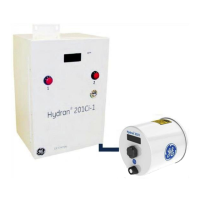Appendix J : Modbus Protocol Documentation
J.1 Introduction to the Modbus for the Hydran 201Ti
Starting with the firmware version 4.0, Hydran 201Ti supports Modbus
communication protocol to allow connection to equipment such as SCADA masters, and
other Modbus master interface, GE’s Perception software or other user software PC
interface. The Modicon Modbus RTU protocol is the most basic protocol supported. In
H201Ti Modbus is available via USB and RS-485 serial links. The selection of the Modbus
protocol and its configuration are possible through the H201Ti local user interface
(display) .
The following description is intended primarily for users who wish to develop their
own master communication drivers. Please note that:
• The Hydran 201Ti always acts as a slave device, and therefore does not initiate
communication requests; it only listens and responds to requests issued by a
master device.
• The Hydran 201Ti complies with a subset of the Modbus protocol and provides
extensive monitoring capabilities through selected read-and-write register
commands (functions 01, 02, 03, 04, 05, 06, 15, 16 in decimal).
• Refer to the dedicated datasheets for an overview of the Hydran 201Ti
proprietary data mapping models.
Note: The Hydran 201Ti Modbus implementation is not compliant with the Modicon
standard. For a detailed address mapping of the registers and their description,
please refer to section J.5 below.
Even if most of the Modbus registers are write-protected, be
careful when writing to a device’s Modbus address. In order
to prevent errors and possible loss of data, please refer to
Section J.4 for detailed operation.
J.2 Modbus RTU Protocol
J.2.1 Physical Layer
The Modbus RTU protocol is hardware-independent and accommodates the physical
layers of a variety of hardware configurations, including USB and RS-485.
Each data byte is transmitted in an asynchronous 10- or 11-bit data format,
consisting in 1 start bit, 8 data bits, 1 stop bit, and possibly 1 parity bit. This can be
noticeable for modem transmissions at high baud rates (many modems do not achieve
communications at baud rates higher than 300 bps with 11-bit data frames).
The baud rate and parity are independently programmable for each communications
port. For Hydran 201Ti the baud rates options are 1,200, 2,400, 4,800 and 9,600 bps.
Even, odd, and no parity are available.

